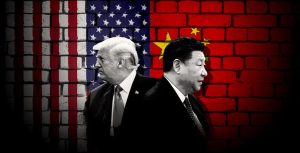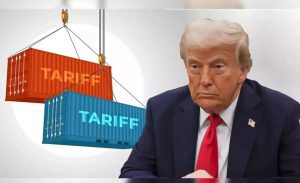US President Donald Trump stirred controversy again by claiming that world leaders were “dying to make a deal” with the United States, amid rising tensions over the new tariffs imposed earlier this month. In a speech delivered at the National Republican Congressional Committee dinner on Tuesday, Trump boasted that leaders from several countries had been reaching out, eager to strike agreements and resolve ongoing trade disputes. He argued that his administration’s tariffs, aimed at addressing trade imbalances, would eventually lead to a more prosperous America.
This dramatic statement by Trump followed his announcement on April 2 that new tariffs on various goods would take effect. Trump’s bold rhetoric came amid mounting concerns over how these tariffs could escalate trade tensions further. According to the president, the tariffs were not just punitive measures but part of a broader strategy to “make America rich again.”
Trump continued to paint a picture of foreign leaders desperately seeking to negotiate, joking about the level of eagerness with which they approached him. “These countries are calling us up, kissing my ass,” Trump stated, continuing with an exaggerated portrayal of their willingness to make deals, adding that they begged, “Please, please, sir, make a deal. I’ll do anything, sir.”
Also Read : Air India Passenger Allegedly Urinates on Co-Passenger During Delhi-Bangkok Flight, Airline Responds
Targeting the Pharmaceutical Industry
As the new tariffs took effect on April 3, Trump hinted at his next move – targeting the pharmaceutical sector. In his speech, the president emphasized that the pharmaceutical industry needed to bring manufacturing to the United States. According to Trump, the tariffs would force pharmaceutical companies to shift production within the US borders, which would boost American jobs and reduce dependence on foreign manufacturing. Trump’s administration has long criticized the pharma sector for high drug prices and a reliance on foreign production, and this move marks the next phase in his trade policy efforts.
The potential impact of these new tariffs on global trade could be significant. Pharmaceutical companies rely heavily on global supply chains, and the imposition of tariffs may disrupt this interconnected network, especially if companies are forced to shift manufacturing to the US. While Trump claims this will create jobs, critics argue that such policies could lead to higher costs for consumers and a less efficient market.
Escalating Trade Tensions: China’s Retaliation
Trump’s tariff measures have sparked retaliatory actions from key global players, particularly China and the European Union (EU). Both economic giants have implemented measures aimed at counteracting the US tariffs, leading to concerns about a full-blown trade war.


China, in particular, has been one of the most vocal critics of Trump’s tariffs. In response to Trump’s imposition of a 104 percent tariff on Chinese goods, China announced its own retaliatory tariffs. Initially, China had set a 34 percent tariff on US products, but this figure has now been ramped up to 84 percent. These new tariffs will target a wide range of American goods, including agricultural products, technology, and machinery.
China’s finance ministry confirmed that these new tariffs would take effect on April 10. The retaliatory measures underscore the ongoing tensions between the two largest economies in the world, raising fears of long-term consequences for global trade. As China and the US engage in this tit-for-tat exchange, both sides are feeling the pressure, with businesses on both sides of the Pacific concerned about rising costs and disrupted supply chains.
European Union Joins the Retaliation
Meanwhile, the European Union (EU) has also taken action in response to Trump’s tariffs. The EU imposed its own series of retaliatory tariffs, targeting approximately €21 billion ($23.2 billion) worth of US goods. This is a direct response to the tariffs Trump placed on EU steel and aluminum exports, which he argued were necessary to protect American industries from unfair competition.
The EU’s retaliatory tariffs focus on products that have political significance in the US, including agricultural products like soybeans. Politically sensitive states such as Louisiana, which are major producers of soybeans, could feel the brunt of these measures. In addition, luxury goods, motorcycles, and other American-made products will face higher tariffs in the EU.
On April 8, a majority of EU member states voted in favor of these retaliatory tariffs, which are set to begin taking effect in mid-April. The EU’s actions underscore the complex web of global trade relations and highlight the growing divisions between the US and its trading partners.


The Road Ahead: Uncertain Outcomes
As the situation evolves, the future of US trade policy remains uncertain. Trump’s aggressive tariff strategy, which he claims is designed to address trade imbalances and secure better deals for the US, faces growing opposition both at home and abroad. Critics argue that these measures could have long-lasting negative effects on American businesses, particularly those with global supply chains, and could lead to higher costs for consumers.
The ongoing trade war between the US, China, and the EU shows no sign of abating, with each side digging in its heels. Trump’s rhetoric about world leaders “kissing his ass” reflects the high-stakes nature of these negotiations, but it also underscores the volatile and unpredictable nature of the global economy.
Donald Trump’s claim that world leaders are desperate for a deal illustrates his unorthodox approach to diplomacy and trade. As new tariffs take effect and retaliatory measures escalate, the world watches closely to see how the US will navigate its trade relationships. With tensions rising between major global players like China and the European Union, the outcome of Trump’s tariff policies remains uncertain. Whether these measures will lead to better trade deals for the US or result in an all-out trade war is a question that will shape global economics in the coming years.


